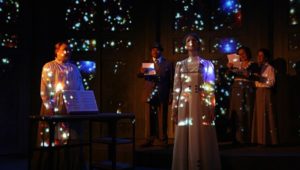
 Highly Recommended **** What will somebody sacrifice for the sake of an obsession? That’s the question at the core of Lauren Gunderson’s 2011 play Silent Sky, now making its Chicagoland premier at First Folio. Henrietta Swan Leavitt (1868–1921) was a computer—a data entry specialist—in Harvard’s astronomy department whose discoveries led to scientists being able to measure the distance between stars and galaxies. Though mostly forgotten by the general public, this play’s fortuitous production shortly after the release of the movie Hidden Figures, about a later generation of women computers, gives Leavitt and her Harvard colleagues a second chance at fame. Though Gunderson’s biography is heavily fictionalized, she and the production team led by director Melanie Keller intriguingly hone in on what, exactly, people hope to gain by studying the stars.
Highly Recommended **** What will somebody sacrifice for the sake of an obsession? That’s the question at the core of Lauren Gunderson’s 2011 play Silent Sky, now making its Chicagoland premier at First Folio. Henrietta Swan Leavitt (1868–1921) was a computer—a data entry specialist—in Harvard’s astronomy department whose discoveries led to scientists being able to measure the distance between stars and galaxies. Though mostly forgotten by the general public, this play’s fortuitous production shortly after the release of the movie Hidden Figures, about a later generation of women computers, gives Leavitt and her Harvard colleagues a second chance at fame. Though Gunderson’s biography is heavily fictionalized, she and the production team led by director Melanie Keller intriguingly hone in on what, exactly, people hope to gain by studying the stars.
Gunderson’s script introduces Henrietta Leavitt by describing her as “a fiercely smart woman, curious, energetic, spilling over her own traditionalism.” As played by Cassandra Bissell, that description is accurate, but Bissel also brings closer-to-mortals humor, wonder, and occasional social obliviousness and self-centeredness to the role. Henrietta lives with her sister, Margaret (Haley Rice), who lacks Henrietta’s love for math and is content with her Congregationalist life and worldview. But although she doesn’t understand her sister’s eagerness to take a job at Harvard studying the cosmos, she is devoted to family as a concept and to Henrietta personally. Margaret is also aware that Henrietta sees her as part of the unsatisfying life she is trying to escape, setting up obvious tension for later, as Margaret predicts Henrietta will eventually yearn for human contact while being constantly drawn back to the void.![]()
Henrietta meets with the professor’s assistant, Peter Shaw (Wardell Julius Clark), and discovers, to her consternation, that she will not be reporting directly to the professor, or actually using the telescope, or conducting her own research on the university’s dime (Henrietta gets paid thirty cents an hour). There are two consolations: she gets along well with the other computers, Williamina Fleming (Belinda Bremner) and Annie Jump Cannon (Jeannie Affelder), and her assignment, cataloging every star in every photograph taken by the telescope, is as important as it is monotonous. And though Peter is annoying and possibly attempts early on to pick Henrietta’s brain so he can steal her ideas, their relationship grows warmer and more mutually respectful over the years.
Although Gunderson’s introductory scenes are heavy on the exposition, she very plausibly portrays the characters’ growth and effects on each other as the decades pass. Henrietta becomes better friends with Annie and Williamina, whom she influences in subtle ways and learns from. Bremner’s Williamina, a woman who historically became an astronomer basically by accident, is always amusing, and she also possesses both great compassion and intelligence. Affelder’s Annie is a steely woman who starts off believing it is right to totally suppress one’s ego for the sake of science, but learns from her friends to demand her just due and exceeds them by demanding respect on a larger scale. As for Clark’s Peter, once he opens up, it is more understandable why Henrietta is attracted to him, since he can be quite insightful when he’s not defensive or trying to assert authority. While Henrietta is taking solace in her developing friendships for her frustration with the research she’s pursuing independently, her relationship with Margaret grows distant: they lack common interests, and Margaret is wearing herself out working for others while Henrietta is wearing herself out working on something of only very abstract benefit, and to future generations at that.
Though Keller’s design team has created a monochromatic world, the characters’ inner lives pop off the stage. Keller is experienced through productions such as Signal Ensemble’s last production, The Drowning Girls, with how to shape an ensemble’s sense of timing and gravity. When Henrietta’s discovery finally does get published, we share her frustration at how many questions remain unanswered, even while recognizing the wisdom of the other characters who point out to her how much she has built. A great deal of credit must go to Bissell for making Gunderson’s modern language sound authentic to her graceful oddball character, though the rest of the cast all hold their own. By showing what drove Leavitt and the people like her, First Folio’s production not only teaches about an important part of history, it also spurs us to pursue and honor their investigations into the natural world, while being more mindful of how much we rely on each other.
“Silent Sky” will continue at First Folio Theatre inside the Mayslake Peabody Estate, 1717 W 31st St, Oak Brook, thru April 30, with performances as follows:
Thursdays 3:00 pm
Fridays 8:00 pm
Saturdays 4:00 and 8:00 pm
Sundays 3:00 pm
Running time is two hours with one intermission. Tickets range from $29-39 and may be purchased by calling 630-986-8067 or visiting firstfolio.org. Parking is available for free on the grounds. Senior and student discounts are available.
To see what others are saying, visit www.theatreinchicago.com, go to Review Round-Up and click at “Silent Sky.”







More Stories
“Mary Poppins : A Staged Concert” reviewed by Julia W. Rath
” I and You”
“Johnny Cobweb” reviewed by Mark Reinecke